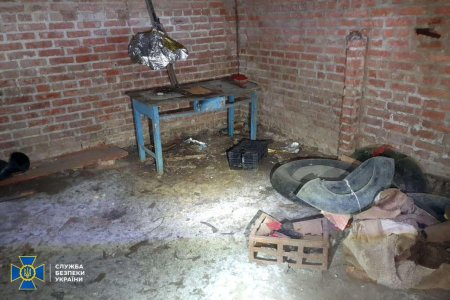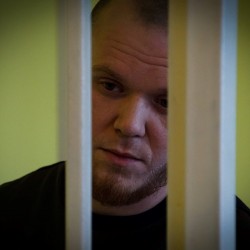
Ildar Dadin, former Russian political prisoner and civic activist, has been killed in action in Kharkiv oblast where he was fighting in defence of Ukraine. Initial reports were, unfortunately, confirmed on 6 October by the Free Russia Legion, citing Dadin’s comrade in arms.
Dadin left Russia for Poland in March 2022, shortly after Russia began its full-scale invasion of Ukraine. He spent the next year organizing Polish documents, as he was told that this would make it easier for him to get to Ukraine. He left for Ukraine in June 2023, joining the Siberian Battalion, one of the volunteer battalions, made up of Russians appalled by their own country’s aggression and fighting on the side of Ukraine.
In August 2023, he gave an interview to MediaZona, explaining that he had assumed the nom de guerre ‘Gandhi’ because of his admiration for Mahatma Gandhi and the Indian leader’s unwavering policy of non-violent resistance. Asked how that was to be reconciled with his decision to take up arms, Ildar gave an impassioned and very moving answer. He had to counter Russia’s crimes, he explained, with such crimes including mass killings, torture, rape and looting. The extreme form of countering such crimes is to kill the perpetrator. It would be “foul hypocrisy”, he says, to claim to be against such crimes, but to say that he cannot counter them as he is against using arms. “If I don’t stop the killings, I will be an accomplice to them”. He did, however, add that he preferred to be able to take prisoners for Ukrainians held in Russian captivity.
He took the decision to defend Ukraine having understood that he no longer had any strength left to keep trying to achieve something by peaceful means when his country had launched a full-scale invasion of Ukraine. He described the Siberian Battalion as a military division of Russians who were fighting against the crimes of their country.
Ildar Dadin became internationally known as the first victim of a draconian law from July 2014 which introduced a new article 212.1 of Russia’s criminal code. That envisaged a sentence of up to 5 years’ imprisonment if a court had issued three rulings on administrative offences within 180 days. ‘Convictions’ on administrative charges have become virtually guaranteed under the current Russian regime, with peaceful protesters detained and prosecuted on the flimsiest of pretexts, or on totally fabricated charges. Dudin was accused of having taken part in four totally peaceful protests from August to early December 2014. He was originally sentenced on 7 December 2015 by ‘judge’ Natalya Dudar from Moscow’s notorious Basmanny Court to 3 years’ imprisonment, with this a year more than the sentence demanded by the prosecutor. It was reduced at appeal by six months, but not revoked.
The sentence received considerable international condemnation, with this intensifying after Dadin reported being tortured in the Russian penal colony where he was held.
Ukrainian human rights groups had repeatedly pointed out that Dadin was almost certainly being targeted because of his active support for Euromaidan, the 2013-14 protests against the then President Viktor Yanukovych’s u-turn away from Europe to close ties with Russia. It seemed clear from the number of times that support had been mentioned during the ‘trial’, that this had contributed to the harshness of his sentence.
The international attention back then did, at least, make the regime backtrack slightly. In February 2027, Russia’s supreme court ruled that Article 212 did not breach Russia’s Constitution, but it did recommend key amendments. It first ordered a review of Dadin’s case, and then revoked the sentence. The Court stated that criminal liability for infringements at public events should be commensurate with the danger to the public of the actions. Criminal liability should not be applied in cases where the infringements were merely formal and caused no harm.
Further confirmation that the backtracking over Dadin’s sentence was due to international pressure is seen in the fact that another activist, Konstantin Kotov, was sentenced in 2018 to four years on the same flawed charges. Like Ildar, Kotov had doubtless annoyed the regime through his active support for Ukraine and for the ever-mounting number of Crimean Tatar and other Ukrainian political prisoners whom Russia was holding.
Ildar continued peaceful civic activism after his release, being detained a few times, but not facing renewed criminal prosecution. He would have certainly been imprisoned, had he remained in Russia after the full-scale invasion of Ukraine.
Ildar Dadin was born in Zheleznodorozhy (Moscow region) on 14 April 1982, into a family with whom he became increasingly estranged because of their support for the current regime (or, at least, unwillingness to speak out). After leaving Russia he had maintained infrequent contact only with his mother.
Ildar was killed in Kharkiv oblast, seemingly near Vovchansk, on 5 October 2024. He was just 42.
Вічна пам’ять Eternal Memory



